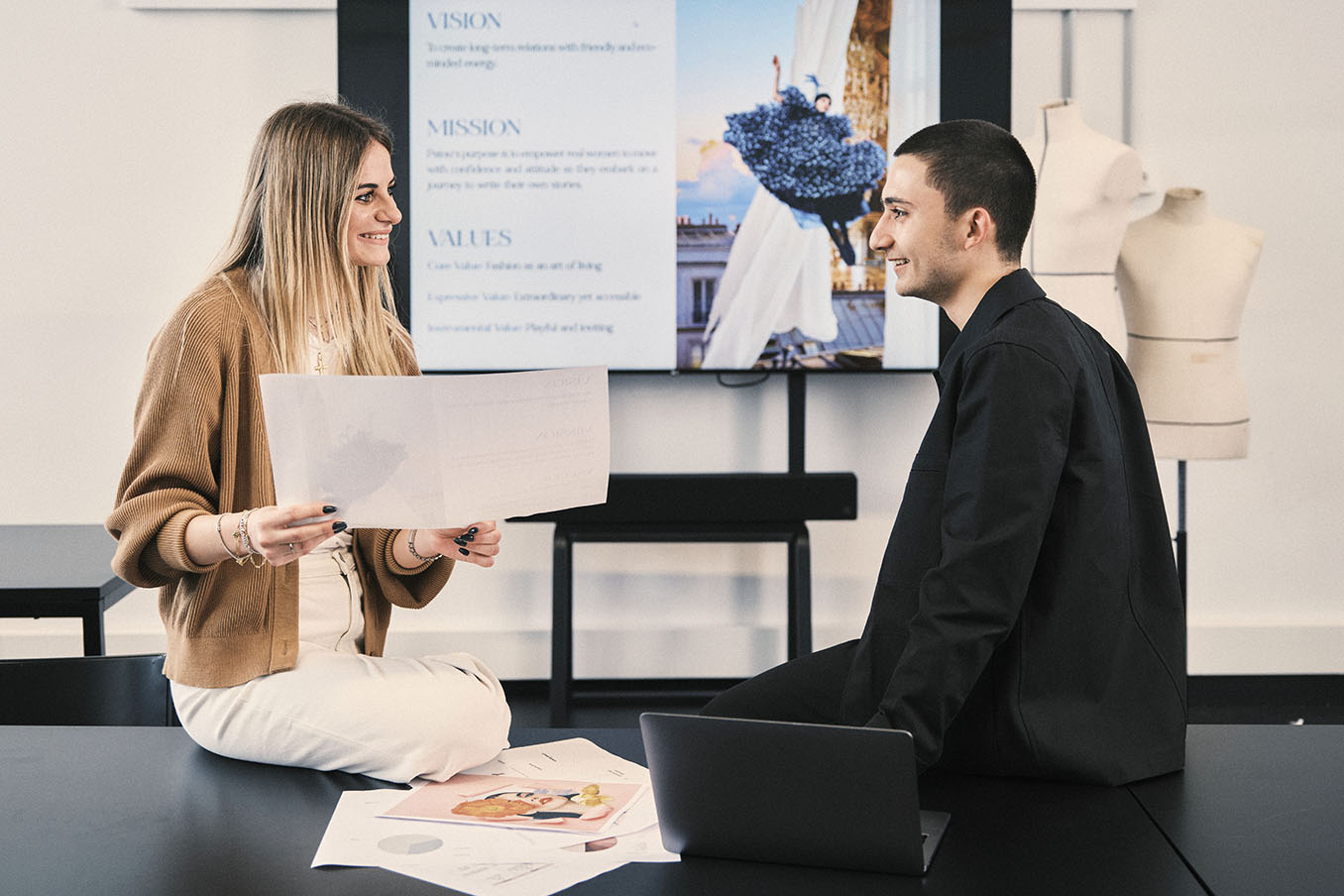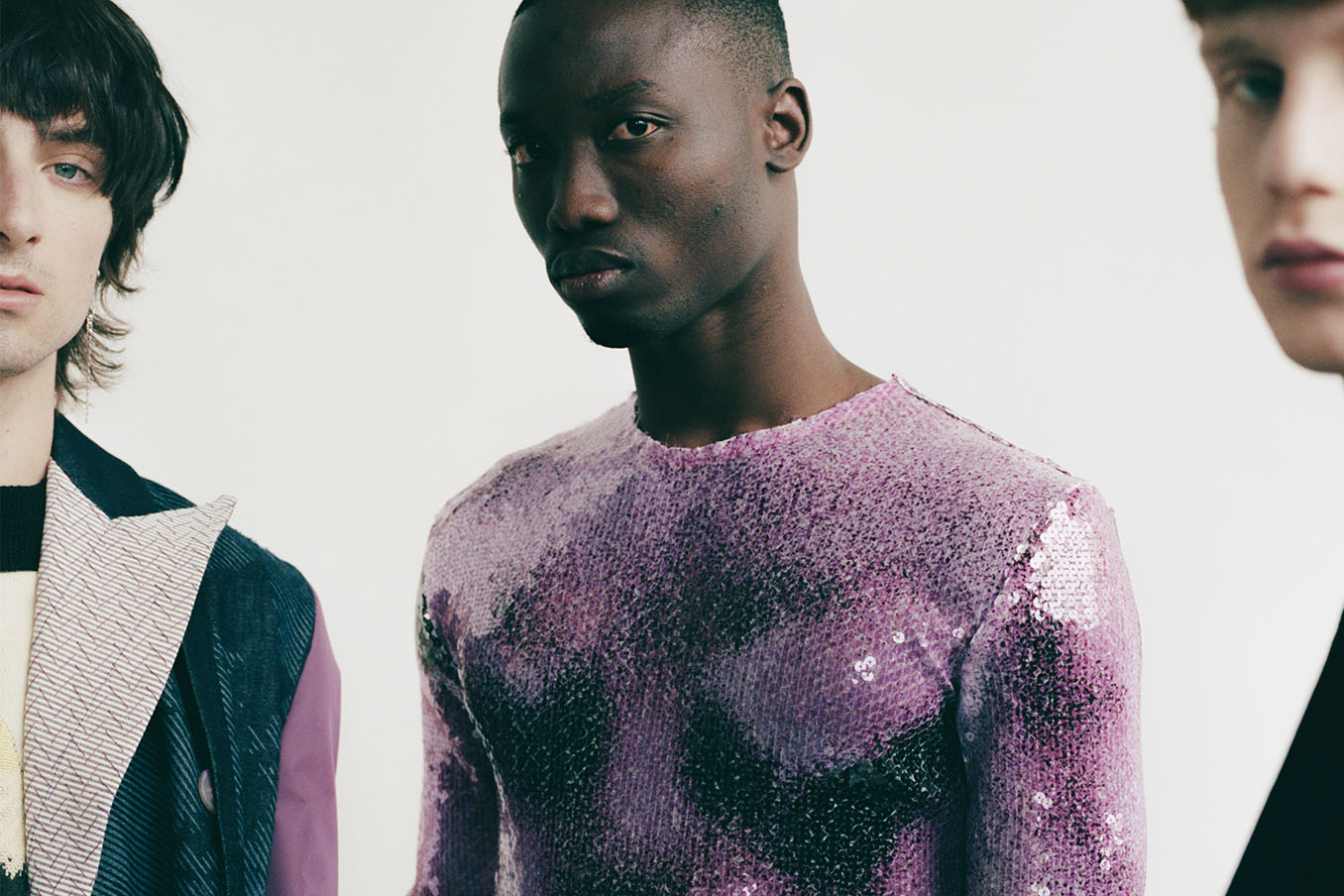Overview
What is Fashion Business at Polimoda?
The Undergraduate in Fashion Business is a comprehensive four-year program that balances creativity and business acumen to shape you as a future leader in the fashion industry. This innovative course transmits an independent vision for students to strike the balance between creativity and business, equipping you with the tools to not just participate in, but to innovatively shape and redefine the fashion system of tomorrow.
Our program diverges from traditional approaches by blending core business disciplines such as marketing and digital innovation, AI with creative insight and innovation, and fashion aesthetics and trend forecasting. Throughout the four years, students explore various lifestyle areas directly connected with the fashion industry including beauty, hospitality, and jewelry, developing a rare ability to collaborate effectively with creative minds while maintaining sharp focus on strategic business development.
Highlights
The course offers a dynamic blend of theoretical foundations and hands-on application, designed to mirror the real fashion industry. This integrative approach ensures students are not only intellectually grounded but also professionally prepared to navigate and innovate within the fast-evolving global fashion landscape. Participation in library affiliated extracurricular projects like AN/ARCHIVE and CineCulture is also encouraged, providing cultural exposure beyond the field of fashion.
Core Competencies
- Fashion Culture & Research Methodology
- Product Development & Supply Chain Management
- Analytical Thinking & Corporate Finance
- Marketing & Digital Innovation
- Merchandising & Buying
- Retail Management & E-commerce
- Brand Development & Entrepreneurship
- Communication & Public Relations
- Leadership & Strategic Planning
Why at Polimoda
Unique mindset
We foster a distinctive approach that develops your sense for creativity, cultural relevance, and continuous visual research based on the changing fashion landscape and consumer behavior. These insights provide opportunities not only in fashion but across creative and lifestyle industries.
International perspective
Our students come from around the world, bringing diverse cultural perspectives and creating a truly international learning environment. This multicultural approach prepares graduates to work effectively in global fashion markets.
Industry integration
Classes are held by industry professionals and academic faculty from the fashion, luxury, and lifestyle industries with hands-on and innovative teaching materials. Small class sizes ensure personalized attention with a leading teacher supporting each student throughout the entire four-year journey. Industry projects are central to the course, providing students with hands-on experience through collaboration with professionals and companies on live business challenges, effectively preparing them for their future careers.
Location advantage
Based in Florence, students breathe culture daily in one of the world’s most important cultural cities. The region’s rich heritage in fashion and luxury manufacturing provides unparalleled access to the industry’s supply chain and craftsmanship traditions.
Learning method
Our teaching methodology combines theoretical foundations with practical application through:
- Faculty and guest lectures with external industry professionals
- Individual and group projects including critical self and peer appraisal
- Independent study supported by Polimoda’s extensive library
- Workshops conducted by experienced teachers with tangible industry experience
- Field trips to gain industry insights and mirror actual professional fashion environments
- Industry projects with companies reflecting real fashion, luxury, or lifestyle industry environments
- Personal portfolio development in preparation for employability and career progression
- Cross-disciplinary collaboration with students from fashion design and art direction programs
- Participation in trade shows, fashion weeks, and company visits (previous editions included Pitti Uomo, Milano Design Week, Copenhagen Fashion Week)
- This course can be completed with an internship
The course can conclude with an internship in the fashion, luxury, or lifestyle industry. Polimoda has a great relationship with international industry, allowing for intern opportunities from a wide range of sources. Our graduates are successful across the fashion, luxury and lifestyle industries and beyond.
Assessment Methods:
- Presentations of student work
- Midterms and final exams
- Mandatory final project
Contact Hours: 600 contact hours per year
Mentorship
Mentors at Polimoda are important professional figures from the fashion industry who come into the school to share tools, guidance, motivation and resources with students throughout their program. They provide valuable and practical insights into how students can take what they learn in their course and apply it to the real world. They are essential to fostering student empowerment via their challenging and stimulating lessons crafted uniquely for Polimoda students.
Paolo Cigognini
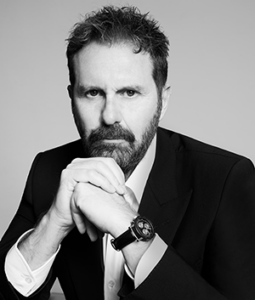 Paolo Cigognini is Senior Vice President of Global Communications and Media at Tom Ford, where he is in charge of ensuring that the brand’s communications and image are consistent and unified across all sectors. At Tom Ford, Cigognini oversees a broad range of responsibilities, from brand equity and strategic communications to paid, owned and earned media.
Prior to joining Tom Ford, Cigognini was Chief Marketing Officer at Alexander McQueen (2017 – 2023), Chief Marketing Officer and E-Commerce Director at Dolce & Gabbana (2014 – 2016) and, before that, Worldwide Communications Director at Bottega Veneta (2010 – 2014) and Communications Director (UK, France, Middle East) at Bulgari (2004 – 2010).
Paolo Cigognini is Senior Vice President of Global Communications and Media at Tom Ford, where he is in charge of ensuring that the brand’s communications and image are consistent and unified across all sectors. At Tom Ford, Cigognini oversees a broad range of responsibilities, from brand equity and strategic communications to paid, owned and earned media.
Prior to joining Tom Ford, Cigognini was Chief Marketing Officer at Alexander McQueen (2017 – 2023), Chief Marketing Officer and E-Commerce Director at Dolce & Gabbana (2014 – 2016) and, before that, Worldwide Communications Director at Bottega Veneta (2010 – 2014) and Communications Director (UK, France, Middle East) at Bulgari (2004 – 2010). Course Structure
Over the four years, group and individual projects are organized, incorporating business acumen with creative insight and innovation. Each project is presented to faculty and peers to encourage intellectual and personal development by embracing critical questioning, and critical self and peer appraisal.
Year 1
- Research Methodology
- Sociology of the Imaginary
- Contemporary Fashion
- History of Costume
- Art & Fashion Strategies
- Fashion Aesthetics
- Product Development
- Fashion Operations & Supply Chain
- Fashion Management
- Fashion Marketing
- Basic Economics
- Global Economy
- Fashion Media
- Digital Planning Tools
- Quantitative Business Methods
- Basic Financial Statement Analysis
- Fashion Communication
- Graphic Design
Year 2
- Contemporary Fashion 2
- Fashion Studies
- Consumer behaviour
- Fashion Marketing 2
- Fashion Communication 2
- Strategic Foresight
- Product Development 2
- Fashion Operations & Supply Chain 2
- Global Merchandising
- Fashion Journalism
- Social Media Management
- Fashion Performance & Event Management
- Photography
- Photoshoot: Photography
- Fashion Styling
- Photoshoot Fashion Styling
- Graphic Design 2
- Cost & Profitability Management
- Corporate Finance in the Fashion Industry
Year 3
- Product Design
- Business Development & Branding
- Responsible Supply Chain
- Graphic Design 3
- Retail Business
- Fashion Retail
- Retail Trends
- Fashion E-Commerce
- Omnichannel Marketing
- Buy-Back Programs
- Visual Merchandising
- 3D Design
- Retail Spaces
- Fashion Merchandising
- Retail Merchandising & Buying
- Buying
- Licensing
- Advanced Financial Statement Analysis
- Self Empowerment for Career Orientation 1
Year 4
- Luxury Economics
- Beauty & Lifestyle
- Fashion Tech & Innovation
- Fashion Law
- Circular Economy
- International Fashion Business
- Brand Development Strategies
- Fashion Marketing 3
- Digital Advertising
- Fashion Finance
- Entrepreneurial Fashion & Strategy
- Quantitative Business Methods
- Fashion Leadership
- Public Speaking
- Graphic Design
- Portfolio
- Self-Empowerment for Career Orientation 2
Careers
This course offers leadership development, self-empowerment, and career orientation from the third year onwards. Based on individual character and acquired skills, graduates can pursue diverse career paths including:
Developing and implementing marketing strategies for fashion brands, analyzing market trends, and managing brand communications across multiple channels.
Managing brand image, media relations, and strategic communications to maintain consistent brand messaging across all sectors.
Overseeing international and regional retail operations with business acumen to analyze sales data, market trends, and customer feedback to optimize store performance and profitability. Responsibilities include inventory management, visual merchandising, team management, budgeting, and developing strategies to increase revenue.
Overseeing the entire lifecycle of clothing and accessory lines from concept through production and launch, collaborating with designers, merchandisers, and sales teams while ensuring products meet market trends, quality standards, and financial targets.
Bridging the gap between design, production, and sales by analyzing market trends and consumer preferences to make strategic decisions about product stocking, quantities, and pricing while collaborating with various teams to maximize sales and profitability.
Selecting and purchasing clothing and accessories for retail sale, analyzing market trends and consumer preferences, attending fashion shows, negotiating with suppliers, and balancing creativity with commercial viability.
Managing financial aspects of fashion businesses, overseeing budgeting, financial planning, and reporting while analyzing costs associated with design, production, marketing, and distribution.
Creating and managing fashion businesses, identifying market opportunities, developing unique brand identities, and handling all aspects from design and production to marketing and sales.
Orchestrating fashion projects from conceptualization to market launch, coordinating cross-functional teams, managing timelines and budgets, and ensuring seamless collaboration toward project goals.
Graduates also find opportunities in managerial roles within broader creative industries, reflecting the program’s comprehensive approach to business education.
Career services
The Career and Company Relations Office supports all students by creating connections with the working world. It promotes educational collaboration with fashion companies via field trips, workshops, and lectures. Customized career services include CV assistance, career days, individual interviews, and internship proposals to help students access the job market.
The course can conclude with an internship in the fashion, luxury, or lifestyle industry. Polimoda maintains strong relationships with the international fashion, luxury, and lifestyle community, providing numerous internship opportunities from diverse sources.
Facilities
Polimoda hosts a range of world class facilities such as state of the art computer labs equipped with an array of 3D modeling and graphic programs, study areas for communal and independent study, two lecture halls, academic services, large professional workshops, photo studios, and café.
Students have access to:
- Two campuses
- All necessary equipment for students to work on individual or group projects
- Access to computer and editing equipment
- Access to one of Europe’s largest Fashion Libraries for visual research
- Study areas and lecture halls
Over its two sites, Polimoda exceeds 15,000 square meters of fashion education spaces, capable of accommodating over 2,000 students. The two campuses at Manifattura Tabacchi and Villa Favard, located a short distance from each other, form a single base for fashion education
Villa Campus
Villa Campus, housed in the historic Villa Favard, serves as Polimoda’s headquarters and heart of fashion business education. Home to programs in marketing, communication, merchandising, retail, product management, and sustainable fashion, this elegant setting combines educational excellence with essential student services. From student orientation to career development, corporate relations to academic support, Villa Campus nurtures both professional growth and creative dialogue in a historic setting that bridges fashion’s past and future.
Beyond academics, Villa Favard stands as Florence’s premier fashion culture destination. The campus hosts international industry leaders and cultural events, creating a dynamic space where fashion education meets real-world experience.
Manifattura Campus
Manifattura Campus redefines the standards of fashion education: modern and multifunctional spaces host classrooms and technologically advanced workshops designed to faithfully reflect the industry’s environment and equipment. Spanning over 10,000 square meters, the campus includes facilities that are ideal for art direction and business students: six photography studios of various sizes, theoretical classrooms, drawing spaces and computer labs with cutting-edge design and publishing software.
Library
The extensive library resources are available to all students to help them study around their subjects with publications on contemporary fashion, arts, business, sociology, and culture, providing a rich context for their studies.
Polimoda’s library is one of the largest fashion libraries in Europe. Located in Florence’s Villa Favard, Centro di Documentazione Matteo Lanzoni – Polimoda Library holds an extensive collection of fashion publications.
Since its establishment in 1986, the Polimoda Library has grown to become a hub of fashion knowledge. With over 29,000 volumes, including books on fashion history, design, textile technology, marketing, and economics, it caters to diverse interests. The library also features an array of fashion magazines, look-books, film resources and online materials. It is also a place for quiet, independent study.
Requirements
The basic requirements to apply for this course are:
- Curriculum Vitae (CV) with motivation letter
- English language proficiency
- Secondary school (high school) diploma or equivalent
This course description and indication of fieldtrips is representative but not exhaustive of the full program. Course content can be updated throughout the program to maintain a future-oriented perspective, ensuring all courses taught are current and applicable to the evolving fashion landscape.
Student work
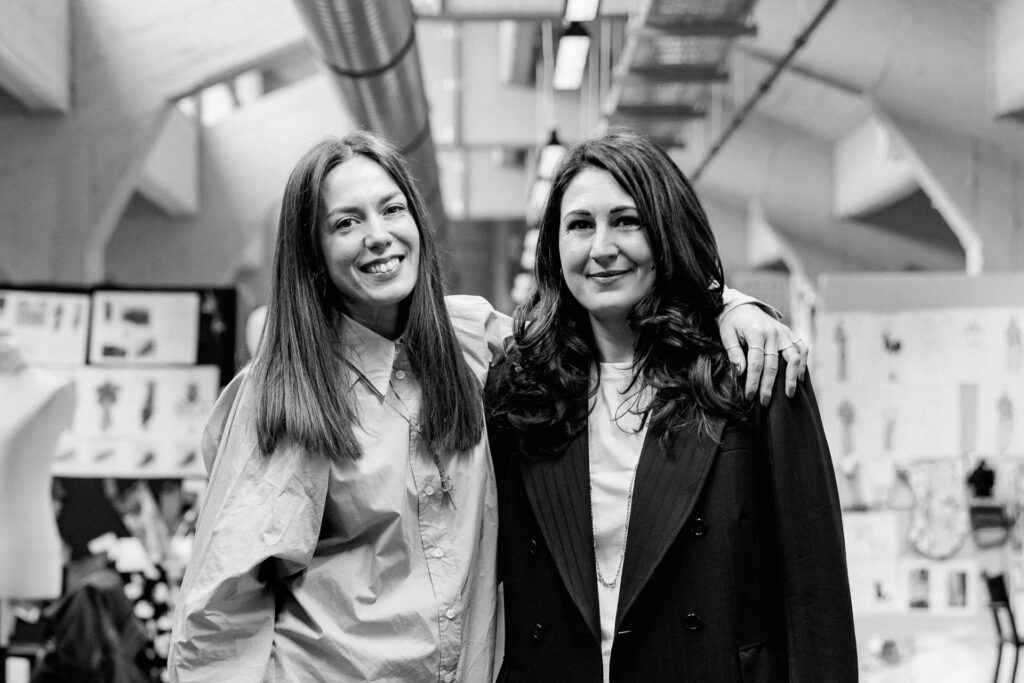
From concept to creation with Dior product developers
Insider tips and strategies for success in fashion Product Development from Giada Tomelleri and Silvia Torrini’s exclusive lecture at Polimoda
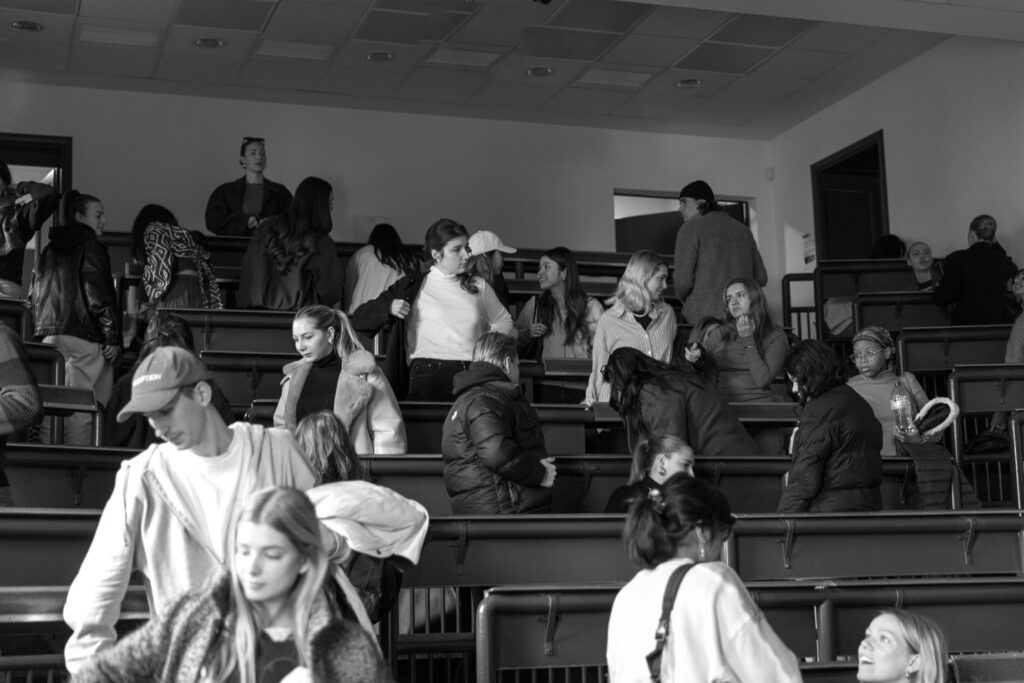
To Create a Legacy in Fashion Business
Honesty, authenticity and a commitment to decisions: a leadership lesson by Paolo Cigognini
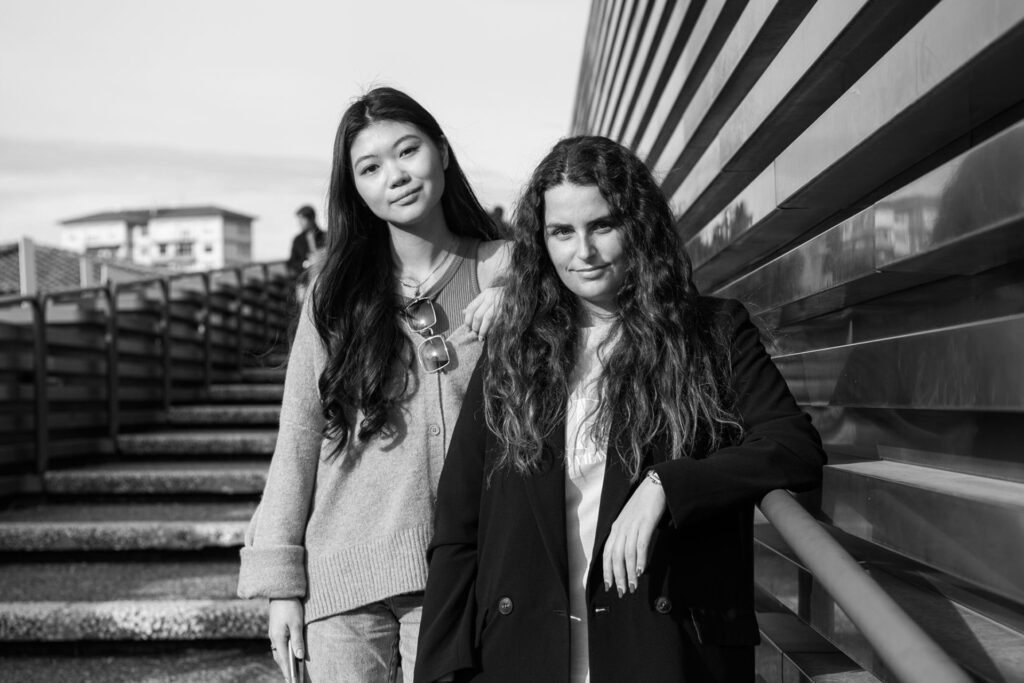
Highsnobiety mentors Fashion Business students in creating content at Pitti Uomo
What Matilda and Anastasiia learned while working with one of the best media platforms in the fashion industry
